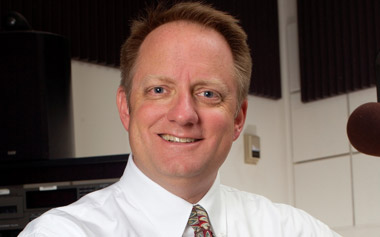WFCR Public Radio interrupted its programming on May 29 to relate, in stunned cadences, the incomprehensible news that Bob Paquette had died. After surviving lymphatic cancer, followed by an unrelated persistent infection, he was taken suddenly and paradoxically by an apparent heart attack.
Bob’s death was widely and deeply felt because he was, in the words of one listener who called in to the station, “the voice of the whole Pioneer Valley.” As the local host of NPR’s Morning Edition, he was the companion of our daybreak routines. Another listener said she felt she had an intimate relationship with Bob because, after all, she woke up with him every day.
I knew Bob because of my involvement in theater and his conviction that the region’s sprawling theater scene should be a regular part of WFCR’s information programming. He brought me in, mentored me and welcomed my contributions to the morning mix. I delighted in our on-air conversations—known as “two-ways” in radio parlance but which I called Chats with Bob— about current and upcoming shows. We were planning on a preview of this summer’s theater season.
Many of those who called and emailed the station last week said they felt they knew Bob, even though they’d never met him. There was a sense of calm and caring in his voice—and his person—that drew you in. When he interviewed someone on the air, one caller said, “you could hear him listening.” He was one of the most present people I’ve ever known, always giving you his full attention even if he was feeling lousy or had other things on his mind.
At a WFCR staff gathering and then at a memorial service last weekend—held at the church in Old Deerfield where he and his husband, Michael Packard, were married—Bob stories flowed along with the tears: anedcotes about his acts of instinctive generosity, examples of his insistent professionalism (“he hated mistakes, his own most of all”), his self-deprecating modesty, his effortless wit.
Though his dry humor got a little air time in impish ad libs during on-air fund drives, in the morning newscasts he was always scrupulously correct. Well, almost always. A colleague recalled that one morning, during a particularly depressing Red Sox slump, Bob was giving the sports scores and said, “The Red Sox didn’t lose last night … because they didn’t play last night.” Whereupon the phone line lit up and an irate fan had to be reassured that Bob was a fan, too.
He was a consummate newsman and a persistent perfectionist who, as an on-air personality, was also of necessity a performer. As a UMass student in the 1970s, he took a couple of theater classes with the great Doris Abramson, and UMass theater professor emeritus Richard Trousdell recalled Bob once telling him that every morning as he was driving to the station, he still did the vocal warm-up exercises she’d taught him.
When someone dies unexpectedly we often realize, too late, how much we appreciated and admired them. Bob Paquette was one of those rare spirits whose presence was valued in real time—by the thousands of listeners who felt they knew him and by those of us who called him friend. One of those friends said it perfectly: “I’m so grateful, and so sad.”



